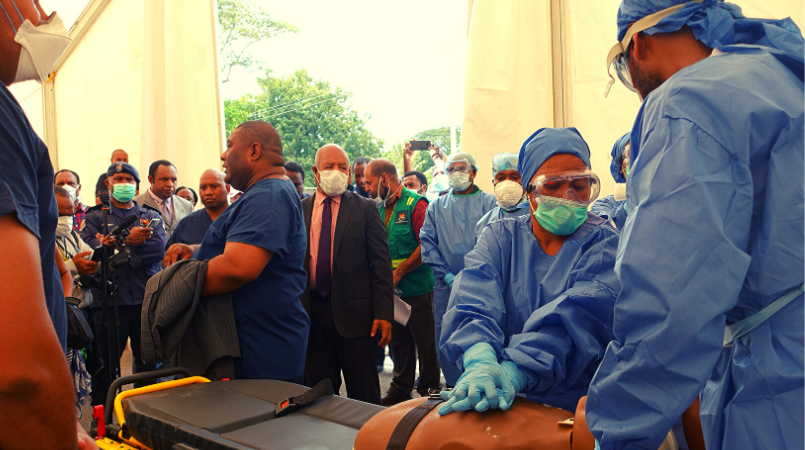
In the forefront of the UN support to the government is the World Health Organisation that is providing technical and capacity building support to the National Department of Health.
This support is aided by funding that has been secured from the governments of Australia, India, Japan, New Zealand, United States and the World Bank.
“The UN is also engaging with donors to re-programme funding where relevant, as for example with resources available through the Spotlight Initiative to invest into work that will ensure safety for women and girls that are affected by gender-based violence.”
Furthermore, UNICEF has distributed an initial batch of Personal Protective Equipment (PPE) to all provinces. A further shipment including 600,000 units of PPE is on its way.
“UNDP and UNICEF have procured 30 ventilators for use by hospitals around PNG. UNDP is procuring other equipment including ambulances and tents,” stated the agency.
“United Nations Office for Project Services (UNOPS) is procuring equipment and various laboratory consumables for isolation facilities and installation in 21 provinces, 10 mobile quarantine units and equipping them for the priority provinces identified by the Government.
“It will refurbish the Port Moresby General Hospital isolation unit and provide 2 Polymerase Chain Reaction (PCR) machines for the Institute for Medical Research COVID-19 testing laboratory in Goroka. UNOPS has also been requested by NDoH to source additional PPE.
“UNICEF, World Food Programme and UNFPA have provided to date, a total of 34 tents for use by the National Capital District and provincial authorities to supplement facilities for triaging, quarantining and isolating patients.
“UN Women has delivered water and sanitation materials and thermometers for use at the Gordon’s, Boroko and Gerehu markets in NCD.
“UNFPA will provide integrated trainings to frontline health workers on COVID-19 prevention and risk mitigation, Sexual Reproductive Health (SRH) and Gender Based Violence in Emergencies/Minimum Initial Service Package (GBViE/MISP).
“At the Governments’ request, UN Humanitarian Coordination capacity was seconded to NDoH to provide general coordination and management with partners and on risk communications and community engagement.
“The Humanitarian Coordination Group brings together UN, NGO and church partners to coordinate, disseminate and amplify messaging in close coordination with the NEOC and Government partners.
“Recognising that this is broader than just a health emergency and that many aspects of peoples’ lives are impacted by COVID-19, the UN is also monitoring and preparing to respond to secondary impacts.
“UN Women, UNAIDS, OHCHR and UNFPA have been engaging with National Capital District and national and provincial partners on protection concerns for high-risk populations, including people living with TB, HIV and people living with disabilities and on matters such as sexual and gender-based violence (GBV).
“UNFPA will provide support to ensure key essential health services on SRH and GBV (i.e Family Support Centre) are operational in the duration of the COVID-19 pandemic.
“UNAIDs has established a COVID-19 Response Centre for people living with HIV (PLHIV) and other key populations and has created a Facebook page to act as a hub for sharing information virtually.
“It is surveying people living with HIV, mapping key clinics, monitoring antiretroviral drug supplies and is exploring establishing a national hotline for PLHIV on HIV treatment.
“It is also working with NDoH and other partners on a HIV treatment supply chain focusing on key treatment hubs throughout the country, ensuring an immediate re-supply of stock in the coming week. This is crucial for ensuring treatment continuity and reducing the strain on health facilities.
“FAO is monitoring food security impacts from both COVID-19 and African Swine Fever in the Highlands and Fall Armyworm in Western and West Sepik (Sandaun) provinces.
“IOM is monitoring displacement related to COVID-19 and response measures in the 16 provinces where IOM is active while UNICEF is working with the Government to assess 18 alternative care facilities in NCD for children in need of alternative care during COVID-19.
“It is providing ongoing financial and logistics support to map available services across all provinces for children in need of care and protection and the impact of COVID-19 on the delivery of these services.
It is also conducting rapid needs assessment of the social welfare workforce in the country and the impact of COVID-19 on their work and or capacity to operate.
“In addition, UNICEF is finalising agreements to implement WASH facilities and a hygiene campaign in 39 high density schools in NCD. With EU support, UNICEF will complement ongoing water and sanitation work in 300 vulnerable communities in four districts of Goroka, Mt Hagen Central, Nawaeb and Central Bougainville by providing clean water to 2,045 households and hygiene kits to 1,410 households to help prevent disease spread.”
(A health worker performs CPR during simulation)
